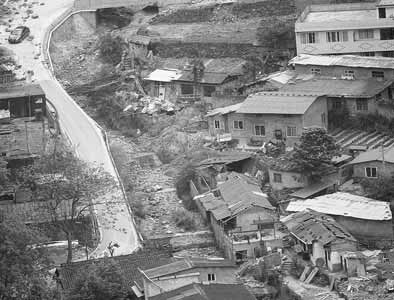No new stimulus needed as economy remains stable
|
The damaged houses after the earthquake in Ya'an's Baoxing county, in Sichuan province. Cui Meng/ China Daily |
Policymakers to focus on present growth plans; effects of quake 'are temporary'
Experts on Monday ruled out the need for any extra economic stimulus, in the wake of Saturday's earthquake that struck Ya'an, Sichuan province, insisting the effects of the disaster will be "regional and temporary", in monetary terms.
Although official figures are still unavailable, Beijing-based Anbound Consulting has estimated direct economic losses in Ya'an to be around 42 billion yuan ($6.8 billion), or 5 percent of that reported in the 2008 earthquake in Wenchuan, Sichuan province.
In November 2008, the central government launched a 4-trillion-yuan stimulus program, just six months after a magnitude-8.0 earthquake claimed nearly 70,000 lives in the province, and caused more than 850 billion yuan in direct economic losses, almost 3 percent of GDP in that year.
Zhang Ping, the former head of the National Development and Reform Commission, the country's top economic planning agency, said in March 2009 that 1 trillion yuan of that package was invested to the post-earthquake reconstruction program.
The actual investment reached 1.7 trillion yuan when reconstruction was completed in early 2012, according to Sichuan provincial government.
However, Liu Shangxi, deputy director of the Research Institute for Fiscal Science under the Ministry of Finance, said on Monday that although the Chinese economy faces the challenge of two unexpected natural events - H7N9 avian flu and the earthquake - any economic stimulus similar to that of 2008 was unlikely.
"More stimulus is the last thing we need at the moment," he said, explaining that the economy is now on an overall stable trend, and macroeconomic policies would not be affected by Ya'an's 7.0-magnitude quake.
He added that any relief work needed in the aftermath would be carried out gradually, over the next two to three years, thus the cost of that would not put any pressure on the country's overall fiscal position.
Total fiscal revenue from all China's local governments was 6.1 trillion yuan in 2008. By 2012, that figure had almost doubled to 11.7 trillion yuan.
Yang Weixiao, an analyst with Lianxun Securities, said he expected the relief work would mean an extra 2 percent industrial added value to the Sichuan economy, which can be translated into nearly 0.1 percent on a national level. The cost of the rebuilding was likely to add an average 0.5 percent to the Consumer Price Index for the next three quarters, Yang added.
Zhou Xiaochuan, the governor of the People's Bank of China, the central bank, said during the recent annual meeting of the International Monetary Fund that the country's 7.7 percent growth recorded in the first quarter of this year was a "reasonable level", and that the government's prudent policy stance should mean steady growth and stable price levels.
He stressed that economic reform in China has to take preference over high-speed growth over the short-term.
Tang Jianwei, a senior analyst with Bank of Communications Co, said the economic stimulus measures introduced in late 2008 were mostly meant in response to a sharp slowdown in the economy due to external influences.
"But today, the slowing economic growth is mainly the result of a lack of internal motivation."
Besides, Tang added, that 2008 stimulus package had also resulted in issues such as an overheated housing market.
"The impact of natural disasters only has a short-term effect on an economy. Over the long term, such an impact is often countered by the resultant reconstruction program," Tang said.
Wendy Luo, an analyst with Barclays Bank in Hong Kong, said the Ya'an earthquake was likely to delay plans by property developers, and hurt the confidence of house buyers, which could hit prices and earnings in Sichuan province.
weitian@chinadaily.com.cn



















